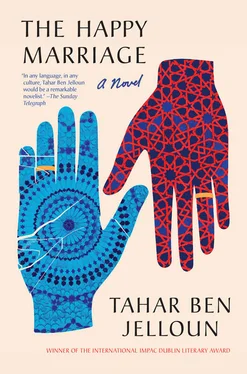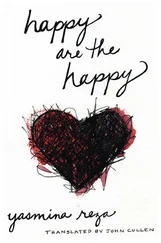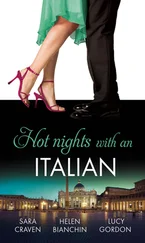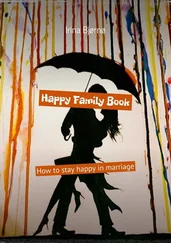When the painter thought he’d taken enough photos and produced enough sketches, he and Brek had returned to the village, where a sumptuous dinner awaited them. The tajine with mutton and olives had been very greasy. He hadn’t been able to eat, and had instead eaten some couscous that was just as greasy as the tajine. He’d been ashamed to be unable to enjoy the dishes that the women had spent the whole day preparing. Fortunately, the other guests had gobbled everything up. He’d slept in the room reserved for prayers. Stomachache and heartburn had prevented him from getting a wink of sleep. He’d left the house early the next morning and discovered a light that was incredibly soft and subtle. He took a few photos in order to remember it. On his return to Paris he’d immediately started to work on paintings about everything that he’d seen and which had affected him during that trip.
His wife had stormed into his studio and recognized her village. The two canvases were still unfinished. She’d looked at them and on her way out she’d said:
“The money you make from those paintings will go to Khamsa. You don’t have the right to exploit those poor people. They don’t even know that you’re profiting from their misery. You’re just like your photographer friend who shoots workers in the mines and then exhibits them so he can make a pile of cash. This kind of thing should be forbidden.”
Even though he didn’t know whether she’d heard him, he’d said:
“They’re not for sale.”
Some people say that you can tell what the souls of the dead have transformed into by looking at how the color of their hair has changed.
— LUIS BUÑUEL, The River and Death
One day, by which time they were living in their beautiful new house in Casablanca, his wife had come up to him and told him in a laconic tone: “I know you’re cheating on me, and I even know with who!”
The time of suspicions had begun. She would never stop. She would spy on him and never trust anything he said, and was skeptical of every woman in his entourage. Her jealousy knew no bounds. While he’d been preparing to leave for Berlin to appear on a panel about art and literature with Anselm Kiefer, his wife had told him that the trip had been canceled.
“How is that possible?” he’d asked. “Who did that?”
“Why, I did, who else? A girl called to ask what time your flight was going to land in Berlin, it was a North African girl, someone called Asma … I could tell from her voice that she was a little slut, and so I told her my husband wasn’t interested in that so-called symposium and that he was going to stay here with his wife, then I hung up on her.”
That episode had made the painter furious. He tried to remedy the situation, but it was too late — his wife had ripped up the invitation and he didn’t have the organizer’s name. He was very embarrassed by it all, and he discovered how dangerous his wife could be for him. He tried to call one of his friends in Berlin but nobody had answered. It was the day before the conference. He found it impossible to cool down. He slept in the living room that night and decided he would go see his sick mother.
By the following morning, the painter still hadn’t regained his composure. He was in a hurry to be far away from home. Bitter over the canceled conference, he’d pondered the situation while driving to Fez, where his mother lived. He recalled a recent dinner with friends at the Mirage Hotel just outside Tangiers. His wife had started to say terrible things about one of their mutual acquaintances. She just made things up, saying whatever came to her mind, and had accused this person of almost drowning their children, then stopped in midsentence and addressed her husband: “You’re not a man, and you’re even less of a husband! If you were a real man you would cut ties with that so-called friend who almost killed one of your children!” Unable to take any more, the painter had lost all control and had thrown a glass of water in his wife’s face. She reacted immediately and threw a glass of wine in his face. His eyes could no longer see and he spent a few moments in complete darkness. Everyone in the restaurant had witnessed the scene. The other couple had tried to calm things down. But the violent way in which things had happened made him feel really bad, and he blamed himself for his lack of restraint. He would never again let himself go so far. His eyes welling with tears, he left to go for a walk on the beach with his friend. “When violence sets in,” his friend had said, “married life is no longer possible, everything quickly boils down to makeshift repairs and lying to oneself. At that point, divorce is the only option.” It was the first time he’d heard anyone use the word “divorce” in reference to them.
Whenever his wife left on a trip and he found himself alone with his children, their house in Casablanca would suddenly become calm and life would unfold without any drama. Even his children’s behavior grew less petulant. The painter would observe his house and say to himself: even the walls look more relaxed. An unusual sense of calm would reign over the house, which he would have liked to prolong beyond those absences. But how would he manage to do it? When they lived in Paris and he would go to work in his studio, he would wind up spending the night there because he sensed that a storm would be waiting for him on his return home. Thus he would postpone it for a night, hoping this would lessen the tide of recriminations. His wife suspected that he wasn’t alone during those nights, and she would barge into the studio in the middle of the night and then leave without a word. She started referring to his place of work as a “so-called studio,” or even bluntly as a “brothel.”
Admittedly, the painter had often entertained female friends in his studio, usually in the afternoon, which he preferred. He worked in the morning, and after lunch he always liked to take a nap. One of his friends in particular knew better than anyone the meaning he attached to that word. She was a young married woman who was a professor of applied mathematics. She loved those moments when she would visit the artist, whose work she knew and liked before they met. She would bring him presents, often parcels of tea with subtle fragrances; she loved him, while also loving her husband, with whom she’d come to an arrangement that allowed her freedom without the need to resort to lying or trickery. At no point did the painter feel guilty. He was doing nothing wrong, he was simply looking for some equilibrium outside of his marriage, which only functioned intermittently, depending on events that transpired in the family or trips abroad. He spent hours talking to the prof — which was what he called her — and he sometimes even confided in her. Sometimes they also made love, but this wasn’t the most important component of their relationship. After a couple of years, they’d managed to achieve a sense of peace, which they’d both needed, him in particular. There was friendship, tenderness, and especially sensuality. They drank tea and talked about the exhibitions that were currently showing. She knew him intimately and was able to anticipate his desires. She loved to read and would tell him which eighteenth-century writers really blew her away. That bright-eyed prof had brown hair and skin that was stunningly white. Whenever she undressed, he would ask her to walk around the studio so he could better admire her body and demeanor. She would beg him to remain dressed, then she would kneel before him and slide his pants down using only her teeth. Then she would take his penis in her hands and stroke it for a long time, kissing it and not letting it go until she’d swallowed his seed, which spilled against the roof of her mouth, and sent shivers all the way down his spine.
Читать дальше












